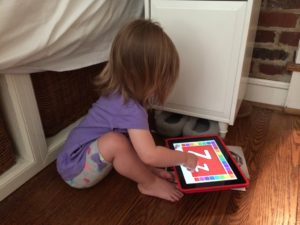SCREEN TIME AND BABIES – ADVICE FROM A PEDIATRICIAN
We are all guilty of it…giving your child an iPad to get a small break during the day. Just how harmful is it? Keep reading for Spring Valley Pediatrics Dr. Jessica Long’s expert advice on how much (or how little) screen time is appropriate for our children.

You are probably reading this on your phone, maybe catching a minute’s break during your baby’s afternoon nap or between answering emails. Texts, emails, adorable Instagram photos – there are plenty of reasons your phone is always within reach but what does it mean for your young child’s development?
We know that babies’ brains do a lot of growing and changing in the first years of life. From birth to two years old, a baby’s brain triples in size and is busy forming neural synapses (connections within the brain). Too little stimulation, as can happen to neglected children, causes the brain to under-develop. However, too much stimulation is also harmful to the maturing baby brain. Studies have shown that prolonged exposure to rapid image changes, like what is seen in children’s TV shows, during this critical period of brain development creates a mind that expects high levels of stimulation. This can lead to attention problems later in life; the more TV that is viewed before the age of 3, the more likely that child will have attention problems at age 7.
The American Academy of Pediatrics (AAP) recommends that, outside of video chatting with family, children under the age of 18 months have zero screen time. We know that children learn best through interacting with the people around them instead of with electronics. Exposing them to TV, tablets, and phones (including apps and shows that are meant to be educational) can actually cause children to speak later and use fewer words. Even having the TV on in the background, which many of us do when we are at home, can affect our baby’s language development. With the TV off, a parent speaks an average of 940 words per hour to a toddler. However, with background media on, the average is 170 words an hour, and important language tools such as facial expressions and body language are negatively affected.
So what is a busy parent, who deserves some down time scrolling through Facebook, to do? First, monitor your own use. When you are with your little one, put down your phone, turn off the TV, and give your child your undivided attention. Sing, read, and play with her. Make eye contact and use body language to communicate, all of which help her learn best.
Once your little one is 18-24 months old, the AAP gives the thumbs up to some screen time. Parents should choose high-quality programming and watch it with their child. Engaging your child in the viewing experience – asking questions, pointing things out, and helping him make connections to real life – make screen time more interactive.
I would be lying if I claimed to have never pulled out a tablet as a last resort on an airplane to calm a toddler throwing a tantrum. Every parent has been there, but do your best to avoid using screen time as an emotional pacifier. It’s important for your child to learn how to identify and handle strong emotions and to come up with activities to manage boredom or calm themselves down. The next time you are at a restaurant or in the doctor’s waiting room, let your child explore a new book, create a drawing with crayons, or play “I Spy” with you to pass the time instead of relying on a screen to keep her entertained. Added bonus – it gets you to put your electronics away, too, and I know I could benefit from some more unplugged time.


